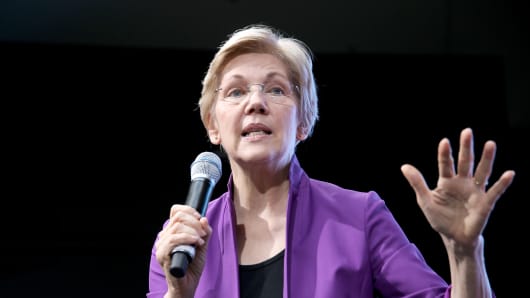After falling off the political radar a bit this summer, Massachusetts Senator Elizabeth Warren is back in the spotlight after her withering takedown of Wells Fargo CEO John Stumpf in Tuesday's Senate hearing. But as strong as it was, it wasn't really unexpected coming from Warren who's made taking on big corporations and Wall Street her entire political raison d'etre.
What was different is the fact that not only were there no Wells Fargo defenders among the Senators in the room, there weren't even any Senators speaking up all that much for the banking industry as a whole. Wall Street and the big banks, at least at this moment in time, is political poison in Washington, D.C.
And it's not just the financial sector. Big pharma is just as poisonous as we saw at the Mylan/EpiPen hearings Wednesday. Republicans and Democrats at both hearings piled on, and they did it with that, "this could hurt my re-election chances if I don't," look in their eye.
Does this mean the era of cozy relationships between big business and the richest financiers and Washington is over? The answer is it's more like it's taking a "time out."
You'd have to be pretty naive to think all those Senators and Congressmen are going to kiss that financial gravy train goodbye so quickly. More likely, they're making a public stand now and hoping everything will blow over in time. History suggests that's the best bet; voter attention always ebbs over time even when it hits outrage levels.
But the surprising success of the Bernie Sanders presidential campaign and the different kind of rhetoric we've been hearing from Donald Trump predict what could be a different future. Make no mistake, the Warren/Sanders ideology in regards to big business/Wall Street has taken over the Democratic Party.
The takeover has been so complete that Hillary Clinton has been forced to run to catch up with it throughout the primaries and the general election so far. Tuesday's performance leaves no doubt that Warren is truly the biggest rising Democratic star in American politics. Even if Clinton wins the White House, Warren will wield considerable influence on her legislative agenda. And if Donald Trump wins, Warren will surely lead the Congressional opposition.
Of course, Trump and his new coalition of Republicans are no lovers of corporate America and Wall Street either. Trump has been criticizing Wall Street in general and hedge fund managers in particular for more than a year. And his stance on trade has every multi-national corporation steaming mad.
When the most powerful and popular names in both major parties are best known for opposing the things you and your industry want, you're in trouble for what could be more than just a moment. And the really bad news is that there's an endless number of existing scandals and cases for any aspiring or savvy politician to go after. If holding hearings and giving CEO's and bankers a tongue-lashing proves to be helpful in the polls, everyone in Washington is going to chime in.
If this climate continues beyond this election, we'll start to see a lot of career members of Congress in both parties decide to retire because they don't want to or can't make a progressive pivot. And if those retirees are replaced by an entire class or two of new Senators and Representatives who eschew corporate/Wall Street backing, we could see very long-lasting change in the financial and political world because of the incumbency advantage alone.
The above scenario might still seem like a stretch to grizzled Washington and Wall Street watchers. But even they would have to admit the chances for this outcome are much better than they were before this election this year and Warren's performance this week. If the current trends continue, a lot of once self-assured pundits, politicians, and CEOs are going to deal with some sleepless nights to come.



